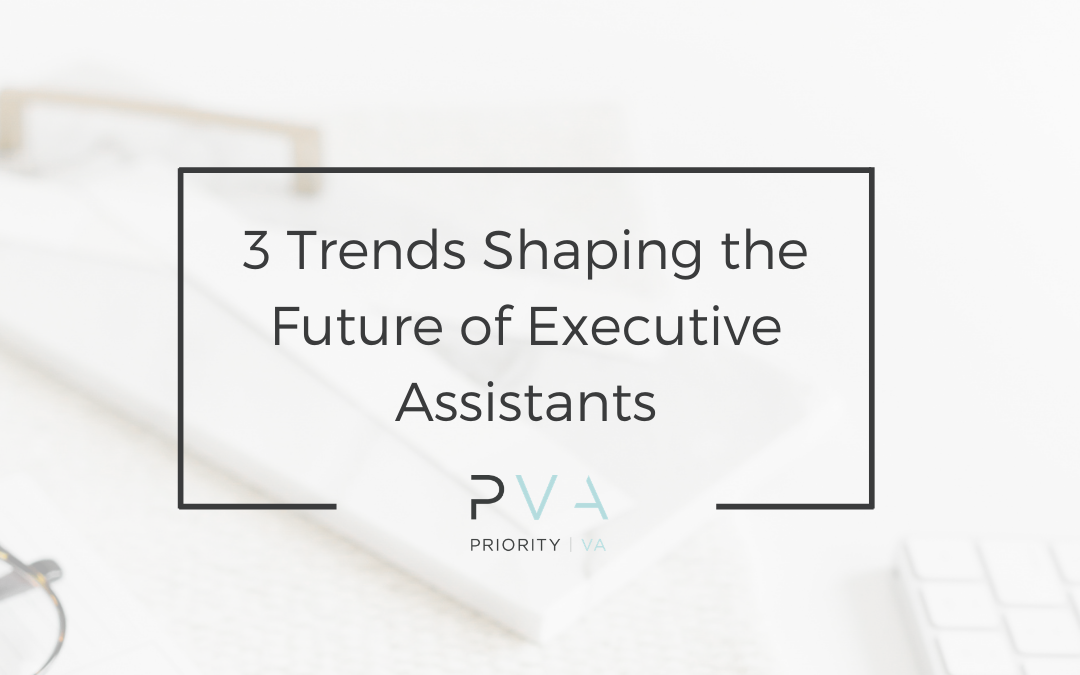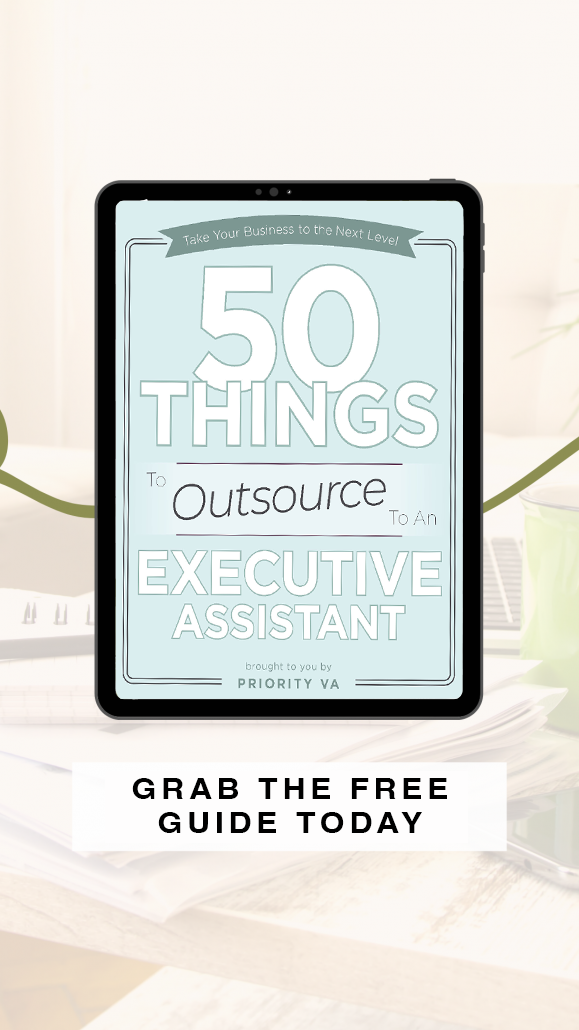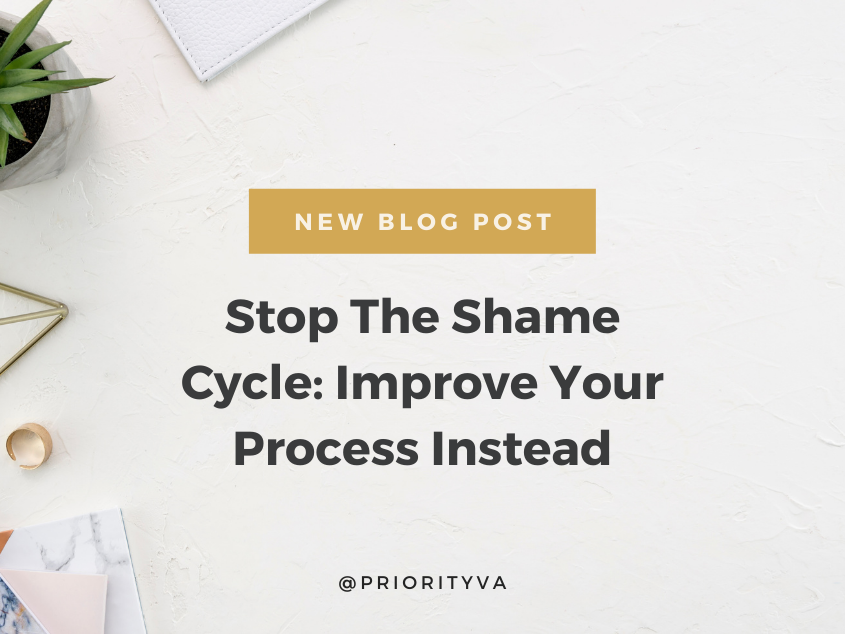I read a 2020 study that said 90 percent of employees would leave an employer who did not show empathy. Can you believe that? 90 percent! I always knew emotional intelligence — in this case, empathy — was important in the workplace, but this makes it all the more urgent to pay attention to HOW we lead.
But this isn’t about us. Not directly. It’s about how our Executive Assistants LEAD on our BEHALF. A trend that affects leadership must also affect the performance of our EAs.
I’m going to share the THREE trends shaping the future for Executive Assistants. Empathy is just one of the three trends EAs need to succeed. Stick around to find out why and to learn the other two. It’s starting right now!
Alright, so three trends shaping the future for Executive Assistants. I’m not going to waste any time.
The three trends I see shaping the future of Executive Assistants are:
- Empathy
- Vulnerability
- And distributed work
I’m laughing to myself a little bit for calling these “trends” because all three have been keystones of a successful relationship with an EA. It’s just that now, Leaders are more open to actually talking about them.
Whether you are listening as a leader or as an Executive Assistant, you will get a lot from this conversation.
Leaders — I hope what you hear today broadens your understanding of how you can relate with your EA. I hope it strengthens trust and connection. I also hope it positively influences your company culture by giving you behavior to model for your team. You’ll also leave with super practical tips for embracing the future of a remote workforce. And maybe even challenge preconceived notions you had about distributed work.
EAs — You will have plenty of actionable advice after this episode. I hope it challenges you to step outside of your comfort zone or to feel confident in the skills you already possess. It may also encourage a conversation you’ve been meaning to have with your CEO, which could be the start of a deeper, more trusting relationship.
Lastly, if you are an Executive who doesn’t yet have a team, what you hear may shatter your notions of how an EA can serve you. We all have these ideas of what a partnership is supposed to look like. But I can tell you from experience, most Leaders significantly underestimate the potential of their relationship with an EA.
Number 1 – Empathy.
I mentioned in the intro the study that showed the importance of empathy. Maybe it’s millennials flooding the workplace or people finally wising up to treating people like humans, but I am SO glad we are FINALLY valuing empathy in the workplace. A good Executive Assistant has always worked with empathy, but may just now be getting recognized for it. There are so many reasons why empathy is an EA’s secret weapon.
Empathy is the ability to understand and share the feelings of another. Empathy is important for EAs because they have to not only HEAR what others are saying. They need the people they serve to FEEL heard and FEEL understood.
To truly hear someone and to help them FEEL taken care of takes incredible emotional intelligence.
Here are some other ways EAs demonstrate empathy every day:
- They use empathy to calm frustrated vendors, encourage scared teammates, and equip a stressed-out CEO.
- They let their boss know that Sally from accounting’s mom died, and they’ve already ordered flowers for the service and have a card for the Leader to sign.
- They listen to understand, not to form a judgment.
- They use empathy when engaging with customers on behalf of the CEO.
- They take a genuine interest in the people they engage with and want to understand their POV. The challenge is to hear and respond without sharing too much of their point of view either way.
Remember, empathy starts at the top. The better you as a Leader model empathy for your team, the more likely they will be to treat YOU and others with empathy as well.
Let’s move on to number 2 – vulnerability.
When we are honest about what we don’t know, and how we are struggling, we allow for collaboration to find solutions.
CEOs are infamous for acting like they have their shit together when they are really falling apart, and EAs can often do the same.
We’ve got to have a space for vulnerability, where we can say “How the heck do you create a pivot table?” or, “My boss is killing me with his endless requests to change his calendar, and I think I’m messing up more than I’m getting it right.”
So, what does it look like to work with vulnerability as an EA? I’m going to list these off:
- It looks like admitting mistakes, owning your failures and taking stock of your growth.
- It means asking for and receiving help as much as you give it.
- It means pausing to share what you’re learning and the challenges you’re having.
Now, full disclosure, vulnerability can be tricky for EAs. As the right hand to your leader, you’ve got to put on a brave face, even when you’re panicking inside.
Leaders — one practical way to foster vulnerability with your EA is to include it as a key metric in your interviews. We ask our candidates to answer the following questions:
- I do my best when . . .
- I struggle when . . .
- I feel stress when . . .
- I am courageous when . . .
- One of the most important things I learned was . . .
- I missed a great opportunity when . . .
- Being myself is hard because . . .
- I can be myself when . . .
- I wish I were more . . .
You don’t get to be on our team if your answers are “oh, I don’t know, I can’t think of anything.” If you aren’t willing to be vulnerable with me about when you feel courageous, you’re gonna really struggle when it comes time to actually BE courageous.
Alright, moving on to Number 3 – Distributed Work
COVID is proof that remote teams are not only possible but in some cases, preferable, to doing amazing work.
I love that COVID showed so many business owners there is more than one way to receive support and manage your team. Distributed work is the present and future for Executive Assistants for a number of reasons:
It gives Leaders access to a better talent pool. You can also access better price points. You can hire a massively skilled EA with 15 years experience from Alabama, working remotely, happy with a salary of $60k a year. That same EA in NYC will want nearly $110K for the same role. Remote EAs open you up to a variety of skillsets, industries and salaries.
Distributed work is the future because of agility. Imagine this — if set up correctly, your team can work when they are at their best. You can attempt to achieve work-life balance, which is kind of bullshit…but, we can all work to integrate our life and work.
For example, if your EA can take 45 minutes off in the afternoon to get their kid from the school bus, settle them into a snack AND still get all their work done…that’s a win.
If they can answer an email at 7 p.m. before they log off at night because that’s when they shut down for the day before a 9 a.m. doctor appointment, that’s a win.
When we allow for agile environments that are holistic in the approach to supporting the whole person — you get buy-in and team dedication.
Your turnover rates will plummet because you’re building a culture that says we care about ALL of you, not just the work you do for us. In essence you’re saying, you’re my assistant, and I care about you! Not just “you’re my assistant, it’s your job.”
Alright guys, are you ready for the challenge? This week, I challenge both the Leaders and EAs listening to be vulnerable in some way. I’m giving you permission that it is OK to show your cards and NOT have your shit together all the time. This isn’t an excuse to go on weepy rants about what you can’t do — but it is an opportunity to work toward a common goal together.
The three trends shaping the future for Executive Assistants are empathy, vulnerability and distributed work.
Empathy is a secret weapon for EAs because it is the reason they can LISTEN and help others feel HEARD and UNDERSTOOD. Empathy can make a good EA truly great. It is how they get inside the head of their Leader, anticipate needs, protect their time and act on their behalf.
Vulnerability is a launchpad to creativity, connection and common goals. It can bring a team or partnership together, foster trust and align interests to get more done. Vulnerability is not weak, it is a form of courage. I have Brene Brown to thank for that truism!
Lastly, distributed work. No, this isn’t an attribute of emotional intelligence. But I believe it’s the future for Executive Assistants because it flings wide the door of opportunity to find EXACTLY who you want beside you.





